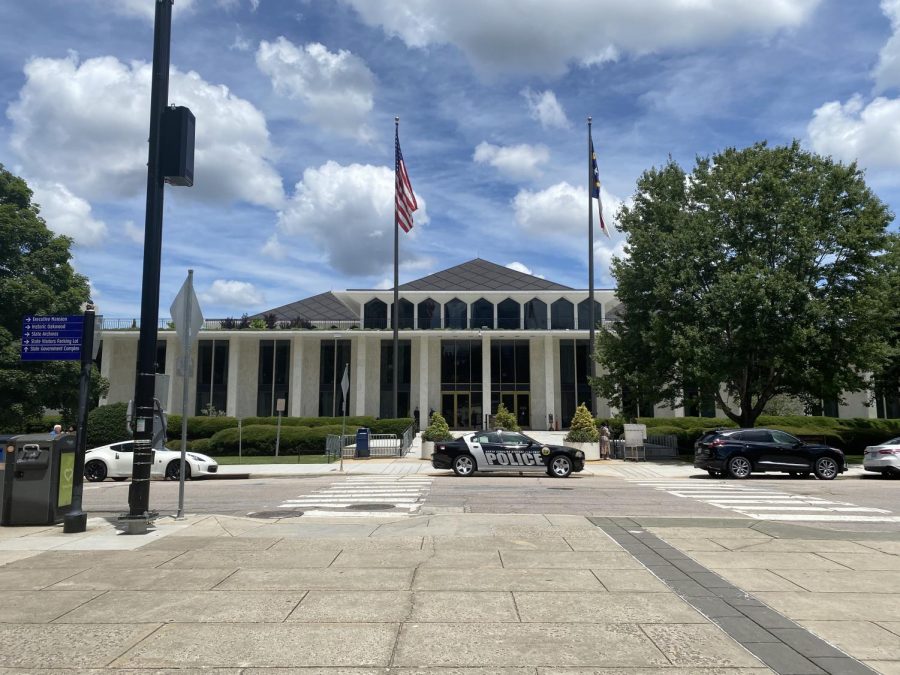Wake Forest’s vaccine mandate reflects a wider conflict
June 29, 2021
A recent email from the administration emphasized that Fall 2021 will mostly be a post-COVID-19 semester. After two semesters in which the narrative of college life was dominated by limited social interaction, mandated masking and virtual classes, the wide availability of vaccines — and the University’s decision to require them, as stated on April 20 — are heralding a widely-welcomed return to normalcy.
“The way I’m thinking about it is closer to Fall 2019 than Fall 2020,” Vice President for Campus Life Penny Rue said. “It’s not going to be as if COVID-19 never happened. We’ll still have masks in our pockets, and there will be places we’ll need to use them.”
University administrators are able to make masks optional in most settings and lift other social distancing requirements and gathering limits as a result of the vaccination requirement.
Across both the state and the nation, pushes in favor of and against mask mandates have swept up legislatures, lobbyists and university officials alike. As the conversation turns into a debate between the autonomy of individuals and the safety of communities, universities such as Wake Forest still retain much autonomy in their decision-making.
“We do not think that North Carolina will pass any legislation that keeps us [from continuing with the mandate],” Vice President for University Advancement Mark Petersen said.
This autonomy was not always a given. In North Carolina, members of the General Assembly have, at times, questioned the ability of private organizations to mandate vaccines that do not have full FDA approval. All of the vaccines currently available in the United States — Pfizer, Moderna and Johnson & Johnson — have been approved for emergency use.
“Mandates are controversial,” Jimmy Broughton, a Raleigh-registered lobbyist employed by Wake Forest said. “The word ‘mandate’ is controversial. If you’re a conservative Republican, you hate that word.”
One bill in particular, House Bill 558, would have prevented private organizations such as Wake Forest from requiring the vaccine. The bill was quickly watered down as it was facing opposition from other House members and stakeholders, including university-employed lobbyists like Broughton. Segments of the original were passed as H.B. 558 and H.B. 572, however, though the laws only prevent government agencies, not private organizations such as Wake Forest from mandating vaccination.
“The original bill, that’s the version that was pretty draconian,” Broughton said. “There wasn’t a lot of debate, honestly. We were glad. We just wanted to move on and not have a huge thing about it, because that never really goes well.”
However, the bill sparked protests in Raleigh. Hundreds of people marched to the General Assembly in its support, voicing concerns about the vaccines’ safety and their ability to choose whether to get the shot.
According to a poll conducted on May 13 and 14 by liberal advocacy group Carolina Forward, those protestors may be in the minority. The poll indicated that 61% of North Carolina voters strongly or somewhat agreed that COVID-19 vaccines should be made mandatory in certain settings once fully approved by the FDA. That poll’s margin of error was around three percent.
The Senate has been quiet on the topic, not taking up any legislation pertaining to vaccine mandates. According to Senator Paul Lowe (D-Forsyth), there has been little debate on the matter despite the concerns raised by some constituents.
“I’ve gotten thousands of emails against a vaccination mandate,” Lowe said. “Well, we’ve never had a discussion about a vaccination mandate.”
According to Petersen, mandating the vaccine at Wake Forest was a way to verify the safety of students, faculty and staff.
“Requiring the vaccine creates a system for accountability and clarifies the risks associated with returning to normal operations for the fall,” Petersen said.
By and large, private organizations’ vaccine mandates are not coming without controversy. Lowe voiced concerns about their legality, noting the possibility of a lawsuit against organizations requiring vaccines.
“I guess, from where I sit, I could see why someone would want to implement [a mandate],” Lowe said. “But while I can see why they’d want to implement it, I don’t see how they can constitutionally do it. I think people have the freedom to not be vaccinated. Now whether that’s responsible, that’s a whole other conversation.”
Lowe cited both the United States and North Carolina constitutions as potential openings for claims of unconstitutionality. Though vaccine mandates are generally considered constitutional under federal law because of the U.S. Supreme Court precedent in Jacobson v. Massachusetts, issues of individual liberty in making personal healthcare decisions have been frequently cited by opponents.
In Forsyth County — including the 32nd district which Lowe represents — COVID-19 cases are easing. The county’s new cases, which sometimes averaged over 200 a day in February, are now hovering around seven per day, according to data from the New York Times.
However, like much of the rest of the country, Forsyth County is experiencing vaccine hesitancy. Even though vaccines are widely available, many residents are opting not to take the shot.
“I would have thought common sense would have done a good job [encouraging people to get the shot], but apparently the governor has to do these million-dollar lotteries,” said Ted Kaplan, Forsyth County’s commissioner at-large. “I just don’t know … I think there are people that are just obstinate.”
With college and K-12 students returning to classrooms this fall, Kaplan voiced concern regarding getting them vaccinated.
“I would think every student would have to be vaccinated unless there’s a physical reason they can’t, and I wouldn’t buy a religious reason,” Kaplan said. “I think that there should be some sort of record of that, and those that don’t get it know that they have to be protected.”
At Wake Forest, a similar viewpoint is pervasive. According to Rue, about 68% of students had been vaccinated when the university stopped using Sneezsafe, which students had used to self-record their vaccination status.
Rue expects a few dozen students, at most, will file for a medical or religious exception to the vaccination mandate.
“We certainly had some pushback on it,” Rue said of the mandate. “But most students were [saying] ‘thank goodness’ because that’s going to free us up to live more normally.”















Anon • Aug 16, 2021 at 9:25 am
Mittens Romney: “I love mandates.”
Ergo, not a Republican.